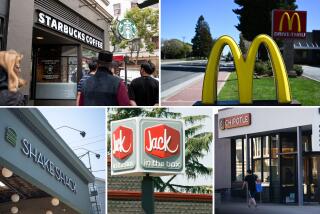California’s recovery might not mean a robust job market
Despite double-digit growth in port traffic, a surge in retail sales and rising consumer confidence, employers added just 1,600 jobs in California in November.
The unemployment rate remained steady at 12.4%, the state Employment Development Department said Friday. The state had added 42,300 jobs in October.
Economists worry that this is another sign that the recovery will be a jobless one in both the state and the nation. The U.S. unemployment rate rose to 9.8% in November from 9.6% the month before as employers added just 39,000 jobs.
“There’s something going on where employers are not yet hiring in relation to increased customer demand,” said Stephen Levy, director of the Center for Continuing Study of the California Economy.
Although the recession officially ended in July 2009, the state is finishing 2010 with only 0.1% more jobs than a year ago. Sectors such as construction, manufacturing and government are ending 2010 with fewer jobs than they had last year — in the case of construction, 37,100 fewer jobs.
“I haven’t seen anything turn around,” said Los Angeles resident Neil Schaber, 57, who has been looking for a job in commercial construction since August 2009. Schaber had been able to find some small odd jobs to string together but said even that has slowed down as families save money for the holidays.
Still, the construction sector added 7,800 jobs in November, posting the strongest increase of any sector in the state. Information added 5,200 jobs, and professional and business services added 3,000. Government, leisure and hospitality, as well as educational and health services, also gained positions.
Trade, transportation and utilities posted a surprising loss in November as the sector shed 12,400 jobs, although the ports of Los Angeles and Long Beach neared a record in November for exports. Manufacturing lost 1,500 jobs. Other sectors experiencing losses included financial activities and mining and logging.
Economists hope that the tax-cut package just passed in Congress and signed by President Obama on Friday will help stimulate the economy further in 2011 and motivate private sector employers to hire. But private sector hiring has remained weak at best in 2010.
“There’s the question of are we entering an economy long-term where employers don’t want to add workers,” said Michael Bernick, former head of the Employment Development Department.
Many workers had hours reduced during the economic slowdown, and employers will increase their hours before they hire new employees, Bernick said. Average weekly hours in manufacturing in the state continued to grow in November, to 40.5 from 39.7 in January. Average overtime hours in manufacturing grew as well, to 4.5 from 3.6 in January.
California is tied with Michigan for the second-highest unemployment rate in the nation, after Nevada.
Los Angeles County employers added 16,500 jobs in November, but the unemployment rate jumped to 12.9%, from a revised 12.6% in October. The county added 4,800 government jobs and 3,600 jobs in the information sector, which includes motion picture employment.
Counties can add jobs but still see their unemployment rates increase as more workers return to the labor force to look for work.
Orange County also experienced an increase in its unemployment rate in November, to 9.3% from a revised 9.1% the month before. It added 1,600 jobs, with significant gain in retail.
In the Inland Empire, which includes Riverside and San Bernardino counties, the unemployment rate rose to 14.3%, up from 14.2% in October. The region added 8,300 jobs, with significant gains in trade, transportation and utilities.
San Diego County added 3,700 jobs in November as its unemployment rate rose to 10.4%, from a revised 10.3% the month before. Ventura County also added jobs, but saw its unemployment rate creep up to 10.8% from a revised 10.5% in October.
The number of people out of work for 27 weeks or more continued to grow in the state, up to 1 million from 693,000 a year earlier. Many of these long-term unemployed workers have run out of their 99 weeks of unemployment benefits. The unemployment benefits bill passed in Congress does not extend benefits for those who have exhausted their 99 weeks.
Alluson Miller is one of the Californians who has exhausted all benefits available to her. The 40-year-old Los Angeles resident is looking for a job in motion picture production but has not found anything. Instead she got a part-time job at a treatment center through a friend.
It’s hard to pay the bills on just 20 hours of work a week, Miller said. “It’s really rough to live on,” she said. “The market’s really bad.”







